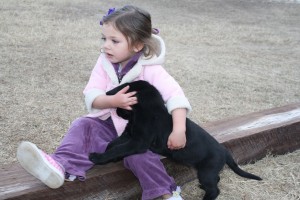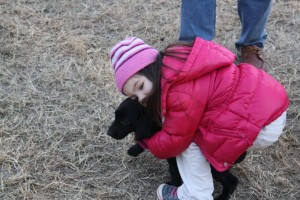Special guest article by Charlotte Iaquinta, M.Ed. on ten reasons owning a Labrador Retriever produces healthier, happier and more well-adjusted children:

Having been a counselor for over thirty years, there are several questions that I get asked over and over again. One of those questions is, “What can I do to produce an environment that will assist my child (children) in being well-adjusted human beings?” Of course, there are many answers to this question, but one answer that I always give is that they make sure that the child has a dog.
Now that I’ve retired, I still get many of the same questions. I am a very involved grandparent, and I am happy to report that my grandchildren all have dogs. According to a recent study at St. Louis and Miami Universities, dogs were found to “benefit the lives of their owners, both psychologically and physically, by serving as an important source of social support.” The unconditional love provided by a dog is compared to that of a brother. Those of us who have siblings all remember bickering with them at times, but we also remember that when someone from outside interfered or became threatening, we all stood together in protecting and defending our own. This behavior is further strengthened by having a dog. Dogs are extremely protective of children and tend to make the children feel much braver when out in the neighborhood with their dog than when alone.
The ten reasons that I am giving for children to have a dog are not listed in order of importance. All of us have different characteristics which we find more important than others. Every reason I list, however, is important to the childhood of your son or daughter.
#1. Dogs can help children grow stronger.
 Just by being a part of the family, dogs can help contribute to keeping your children healthier. According to Science Daily, kids who grow up with dogs have fewer allergies and are less likely to have eczema than other children. They grow up with higher levels of certain immune system supporters that keep them in better shape as they get older. School systems report that children from homes with dogs also have fewer sick days during the school year. Another benefit in this area of physical strength is that kids who play with dogs can take falling down and rough and tumble play much better.
Just by being a part of the family, dogs can help contribute to keeping your children healthier. According to Science Daily, kids who grow up with dogs have fewer allergies and are less likely to have eczema than other children. They grow up with higher levels of certain immune system supporters that keep them in better shape as they get older. School systems report that children from homes with dogs also have fewer sick days during the school year. Another benefit in this area of physical strength is that kids who play with dogs can take falling down and rough and tumble play much better.
#2. Dogs help children to be more physically fit.
All dogs, regardless of breed, need to be walked. Children who take their dogs for regularly scheduled walks tend to exercise more than those who have no reason to get up off the couch and leave the TV. The Journal of Physical Activity and Health (2010) concluded that people who walk their dogs generally walk about an hour longer per day than non-dog walkers. In this age where over one-third of children and adolescents in the United States are overweight or obese, exercise is no longer merely a choice of leisure activity, it is a necessity (Center for Disease Control and Prevention, 2008). What more pleasurable way for a child to exercise than to run and play with an adored dog? All dogs need exercise regardless of size, so children include dogs when they are running or playing casually–not just on regularly scheduled walks.
One of the reasons that I suggest retrievers when parents ask about what kind of dog is best is simply the name. Of course, I grew up with retrievers and I love them, but even more than other dogs, they love to play ball. If you’ll throw it, they’ll retrieve it. The glorious thing about this fact is that they never seem to tire of the “game.” Even babies get excited and laugh and clap their hands when the dog runs after the ball and brings it back.
#3. Regular dog-walking increases social interaction for children–especially those who have just moved to a neighborhood and are feeling homesick for their former home.
 A child who might not want to go out into the neighborhood alone, feels that he or she has a purpose in walking the dog, and therefore can face unfamiliar faces or places more easily than when alone. Doing activities with a dog such as playing frisbee in the yard, or jogging, or merely walking your pooch on a leash is a great way to “break the ice” with new neighbors or other kids on the block. It’s also a good conversation starter like: “Where’s the nearest park?” “Do you know what the Leash Laws are?” “Do you have a dog?” A study by Britain’s Warwick University found that 49% of people reported making friends much easier as a result of owning a dog. Walking the dog could be the perfect way for a shy or awkward adolescent to meet new friends in the neighborhood.
A child who might not want to go out into the neighborhood alone, feels that he or she has a purpose in walking the dog, and therefore can face unfamiliar faces or places more easily than when alone. Doing activities with a dog such as playing frisbee in the yard, or jogging, or merely walking your pooch on a leash is a great way to “break the ice” with new neighbors or other kids on the block. It’s also a good conversation starter like: “Where’s the nearest park?” “Do you know what the Leash Laws are?” “Do you have a dog?” A study by Britain’s Warwick University found that 49% of people reported making friends much easier as a result of owning a dog. Walking the dog could be the perfect way for a shy or awkward adolescent to meet new friends in the neighborhood.
#4. Dogs decrease loneliness in children.
When the older child (children) go off to school, often younger siblings experience loneliness and are sad from missing the older child. A family dog can serve as a companion and friend. A playful dog provides security that one is not alone, especially when Mommy is busy and cannot spend time reassuring the child. Children who come home to an empty house and have to wait for parents or other siblings to return have someone to share their time with. If they’ve had a bad day, they know that they can tell any secret to their canine friend. By having someone to talk to and play with, your child feels much more secure and less anxious about being alone.
#5. Dogs are a mood booster.
Very few of us, if any, have not heard that a “dog is a man’s best friend.” They can also be a woman’s or a child’s best friend, as well. Historically, dogs have been great companions. Research has shown that it only takes a mere 15-20 minutes with your pet to feel more relaxed and calm (per Web, MD). Playing with theirs dogs can raise the level of children’s of dopamine and serotonin, which are neurotransmitters in the brain that are associated with pleasure and tranquility. Also, when children reach out and pet or hug their dog, they are giving of themselves and soon feel better. Why pay for tranquilizers? Besides, who wants to put children on drugs any way?
#6. Dogs are better than popping pills or drinking elixers.
 Not only does being around the family dog help your child’s mood, dogs are great for children’s health. Children with dogs for pets have been found to have lower cholesterol, lower blood pressure, and fewer overall physical complaints than those without dogs. In fact, there are several diseases where dogs have been used to help those who have the disease. Two of these are: rheumatoid arthritis and emotional disturbance stemming from cases of severe abuse. “People have always loved their dogs, but now we’re discovering specific ways to harness the benefits…in psychotherapy,’’ said Dr. Samuel B. Ross, executive director of Green Chimneys Children’s Services in Brewster, NY, where special dogs are used in treating emotionally disturbed children.
Not only does being around the family dog help your child’s mood, dogs are great for children’s health. Children with dogs for pets have been found to have lower cholesterol, lower blood pressure, and fewer overall physical complaints than those without dogs. In fact, there are several diseases where dogs have been used to help those who have the disease. Two of these are: rheumatoid arthritis and emotional disturbance stemming from cases of severe abuse. “People have always loved their dogs, but now we’re discovering specific ways to harness the benefits…in psychotherapy,’’ said Dr. Samuel B. Ross, executive director of Green Chimneys Children’s Services in Brewster, NY, where special dogs are used in treating emotionally disturbed children.
#7. Dogs are great stress relievers for children.
According to a study from SUNY Buffalo (2010), married couples subjected to various types of stressful tasks who were allowed to see their dogs before or after the task, had the lowest responses to stress than those who didn’t. Imagine the effects on family life when the stress levels of parents go down. Children who have a dog feel more secure about home safety and going to sleep in the dark. One of the greatest stresses on children is night fears. To have this overcome, or lessened, is a great benefit to relieving stress. For children who are having any sort of difficulties at school, but especially thoughts and concerns over being liked or accepted, having a dog as a companion that loves you unconditionally is positive and brings with it a good feeling and alleviates symptoms of depression.
#8. Dogs help children to be more cooperative and sharing.
For children, a close relationship with a dog is a proven benefit in study after study. For instance, in research with preschool children, psychologists at Oregon State University found that teaching children to care for a puppy enhanced their social skills. “It made the children more cooperative and sharing,’’ said Dr. Sue Doescher, a psychologist involved in the study. “Having a dog improves children’s role-taking skills because they have to put themselves in the puppy’s position and try to feel how it feels. And that transfers to how other kids feel.’’ Children who were regularly given the opportunity to care for a puppy at their preschool, as well as those with pets at home were found more socially competent. They were more popular, felt better about themselves and were better able to understand other children’s feelings.
#9. Having a dog helps teach responsibility to children.
Whether they’re helping to bathe, feed, or exercise the family dog, children will learn the value of responsibility. Caring for the dog will teach children that their pet is dependent on them for food and exercise and love. Dogs require a lot of care; they need to be fed, walked, played with and trained. Children come to understand that dogs have to learn discipline in order to be pleasant around the family and others. Children come to appreciate discipline by observing how important it is in their dog. Having a dog teaches children patience, commitment and selflessness. Caring for a dog takes a great deal of responsibility. Children learn to be less focused on themselves and more patient with others. Responsibility is a key factor in leadership development in children, and one of the best ways of learning responsibility is in the home with the family dog. Being responsible for a dog teaches children valuable life lessons. The lessons that children learn from having a dog are priceless and may just help in being successful in life and in a career.
#10. Dogs boost children’s confidence and self-esteem.

First and foremost to benefit children’s self-esteem is the experience of being loved unconditionally. As your children get older and are capable of delivering commands to the dog, they will quickly learn to be strong and confident, or most dogs just won’t listen. Furthermore, telling a dog to sit, and then watching the dog do what he was told, provides children with tons of confidence.
Having a dog who will always listen, a non-judgmental companion, and a friend who is always excited to see him/her increases your child’s self-esteem, studies say. Dogs can also help improve your child’s reading skills, as little ones often associate a dog’s enthusiastic ear and wagging tail with positive encouragement. By giving children the confidence needed to consistently practice reading, they become better readers by virtue of the practice. Dog-owning children have fewer sick days off school, and children who own them often have better self esteem. Daily contact with animals and responsibility for their care offers the children a sense of self-worth that doesn’t merely happen because someone tells a child how wonderful he/she is.
“For many children whose nurturing has been faulty, taking care of an animal can interrupt the cycle of abuse repeating itself over generations,’’ said Dr. Samuel Ross, Executive Director of Green Chimney’s Children’s Services in Brewster, New York, “They can learn to be care-givers, even if they haven’t been well cared for themselves.’’ Children who were regularly given the opportunity to care for a puppy at their preschool, as well as those with dogs at home were found more socially competent. They were more popular, felt better about themselves and were better able to understand other children’s feelings.
Many other life lessons are learned by living around a wonderful dog. Some of them are learning to be gentle, benefits of companionship, importance of faithfulness, the safety and security of home and appreciation of the needs of others. Above all the lessons, dogs are just great fun. They can make us laugh, even after a terrible day. They are always there wanting a reassuring hug. A dog’s primary wish in life is to make you, its owner, happy. How noble—and cool—is that?
Are you interested in learning more about labrador retriever puppies for sale for your family? Call us for more information at (910) 462-3246 to purchase a world class Labrador Retriever from Woody Thurman today!
About Woody Thurman: Woody and Judi Thurman of Twin Lakes Kennel have been breeding and training world class Labrador Retrievers for more than 35 years. Twin Lakes Kennel is the number #1 resource for Labrador Retriever puppies. We select from the most dominant American field bloodlines and breed for natural hunting instinct and tractability. Our Labs, both puppies and adults, are out of the top working Labrador Retriever bloodlines in the country. The end results are the most talented, well rounded Labrador Retrievers possible, making them a most desirable family pet.
More than eight thousand (8,000) Labrador Retrievers have been bred and trained during those thirty-five years. During this time, Woody has titled more than 200 AKC Master Hunter Labrador Retrievers. Woody has also qualified 47 retrievers at AKC Master Nationals. He has won the Ducks Unlimited Open Championships twice. In addition, two of his Labs, Drake and Rondy, bred and trained at Twin Lakes Kennel, are in the Master National Hall of Fame.
Our Labrador Retriever puppies are the culmination of a 30 year search for the most talented, well rounded Labrador Retriever possible. We select from the most dominant American field bloodlines and breed for natural hunting instinct and tractability. Our puppies begin a structured socialization program in the litter box and are introduced to birds at six weeks.
All our Labrador Retriever Puppies carry a guarantee against hereditary defects and to have basic retrieving instincts. Parents of all our Labrador Retriever puppies are physically sound with certified hips and eyes. They are out of the top working Labrador Retriever bloodlines in the country.
We guarantee all our Labrador Retriever puppies to be free from hereditary defects.
Call Woody and Judi at (910) 462-3246 for more information.



